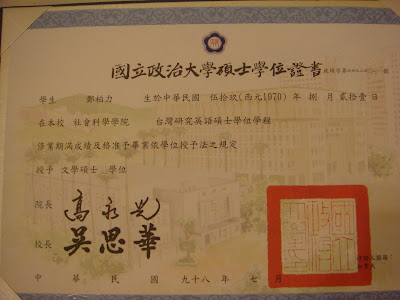
My MA. Interestingly, it states I was born in 1970. Usually in Taiwan, they'll say I was born in 59. This means 59 years after the Chinese Revolution (the one that got rid of the Ching Dynasty, not Chiang Kai-shek). Some of the people I know in Taiwan will appreciate this. They believe this date is not relevant here as Taiwan was a colony of Japan in 1911, and would remain so for another 44 years. I'll have to check with my local classmates to find out if this is now standard.

I concluded the red tape on my MA thesis this afternoon. The title I wanted to go with was: "From Volunteerism to Conscription: Taiwan's Commitment to the Second World War". But I guess I forgot to inform the IMTS secretary at National Chengchi University (國立政治大學), so it's back to "Conscription Versus Volunteerism: Taiwan's Commitment to WWII". The working title should be fine (though the Chinese title doesn't match). I'm just glad to be finished. Now I can read non-academic books and hang out with my family and friends. For the last four months, I've been working 9-6, babysitting 7-10 and writing 10-2. I'm just happy to be done. For the next little while, I'll be academically detoxing.
After deciding my topic, I realized there was a shortage of source material. Thus, I had to collect oral histories on my weekends. My friends suggested writing a book report, but this just wasn't possible. Another logjam I encountered was a lot of people in Taiwan found my topic taboo. Simply put, China fought wars against Japan; that Taiwan joined Japan to fight in China and also took on China’s allies in Southeast Asia was an uncomfortable memory for those with an affinity to China.
I'm interested in the idea of identity formation. Many of the older generation in Taiwan get sentimental about the Japanese, who built their infrastructure (banks, railroads, hospitals) and brought relief from the frontier chaos of incompetent Ching Dynasty rule. But I stayed away from this, instead focusing on mechanisms that allowed the Taiwanese to serve Japan's creation of a Greater East Asia Co-Prosperity Sphere. The Second World War brought forth items and emotions I think some might want to not re-stir, such as Taiwanese celebrations for a Japanese "victory" in Nanking. This is what the British Consul reported in January 1938: “monster celebrations were organized to [celebrate] the fall of Nanking, in which all classes loyally participated”. Around the same time, 200 prominent Taiwanese businessmen gathered to pass a resolution supporting the provisional Japanese government in Northern China.
Anyway, I'll put up my abstract below:
This thesis paper tracks the development of the draft in Taiwan leading up to the Second World War and through its conclusion. In the mobilization of Taiwan as part of the Greater East Asia Co-Prosperity Sphere, many factors played a role in first encouraging and then pressing the Taiwanese population into service, including the propagation of mass paranoia labeled spy fever, Japanifized education policies, assimilation projects, general media stresses, social organization allowing for a police state, economics and the weight of Taiwan’s own unique frontier history. All of the routes created a certain frenzied (for lack of a better word) atmosphere and deserve attention in understanding the processes that led young Taiwanese males, and females, to first volunteer in the Imperial Japanese Army, Navy and Air Force and then comply to institutionalized conscription. The story of these individuals remains overlooked in the current reconstruction of Taiwan’s history. The era has been overshadowed by the turbulent events following the Second World War and the landing of half a million Chinese immigrants in Taiwan upon defeat in China. This corner of Taiwan’s history is still inappropriately relegated to the sidelines.
With the Second World War generation and in particular the 200,000 who served both in Taiwan and overseas as volunteers and conscripts beginning to die off, the need to get their first-hand accounts recorded and preserved for posterity is pressing. In maintaining their information and stories, the interested historian can do service by adding to the historical record. Knowing this, “From Volunteerism to Conscription: The Mobilization of Taiwan for the Second World War” does not seek to score political points in plotting such a course. The thesis paper simply attempts to better comprehend the mechanisms that worked to pit Taiwan against her ancestral China and to comment on the plight of the survivors, bringing up their influence on Taiwan today. So, this paper will delve into 13 years of history, from 1932 to 1945, when Taiwan sat at the side of Japan as a colonial possession, and did its part in an unprecedented modern territorial expansion. The thesis paper wants to explain more about those who served, and why their service and its outcome might remain relevant in shaping Taiwan’s story at this very moment.

 My wife (right) outside the entrance to the Huwei Fort (滬尾砲台) in Danshui, Taiwan. The sign is said to have been inscribed by 1880's Taiwan Governor Liu Ming-chuan ( 劉銘傳). I don't understand it: the first two characters read "North Gate". The other two I'll have to look up some time.
My wife (right) outside the entrance to the Huwei Fort (滬尾砲台) in Danshui, Taiwan. The sign is said to have been inscribed by 1880's Taiwan Governor Liu Ming-chuan ( 劉銘傳). I don't understand it: the first two characters read "North Gate". The other two I'll have to look up some time.








